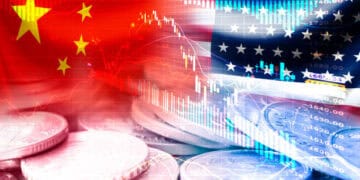The Biden administration has outlined its trade policy priorities for 2023, placing a strong emphasis on recalibrating the United States’ relationship with China and addressing labor rights within global supply chains, according to the U.S. Trade Representative’s report.
Recognizing China’s unique ability as a large, non-market economy to disrupt fair competition through unfair practices, the report highlights the administration’s commitment to combating such practices that adversely affect American workers, businesses, and international partners.
The report underscores the continuation of Section 301 tariffs, initially launched under the Trump administration, targeting numerous Chinese imports. These tariffs received a nine-month extension in December, indicating their sustained presence.
Moreover, the administration is actively exploring various tools and measures, including potential new approaches, to counteract the adverse impacts of China’s state-driven, non-market practices on global trade.
In addition to tariffs, the Biden administration is prioritizing domestic investments in U.S. infrastructure and manufacturing as part of its strategy to engage with and compete against China more effectively. This approach includes investments in technology manufacturing, bolstered by legislation such as the Infrastructure Investment and Jobs Act.
A Shift in Trade Dynamics: Recent years have witnessed a growing trend of moving production away from China, initially spurred by the import tariffs introduced during the Trump era and accelerated during the COVID-19 pandemic. This shift reflects a renewed focus on enhancing supply chain resilience, a departure from the previous sole emphasis on supply chain efficiency.
Efforts to diversify sourcing and reduce reliance on a single global supplier have gained traction, especially in industries where supply chain vulnerabilities became apparent.
Trade Deals and Collaborations: The Biden administration is actively pursuing trade agreements with allies to challenge China’s economic dominance and advance shared objectives related to sustainability and workers’ rights.
Key initiatives include the Indo-Pacific Economic Framework for Prosperity, launched in May 2022, which aims to serve as a model for other regions by focusing on supply chain resilience, decarbonization, and infrastructure. The report also highlights the Americas Partnership and ongoing bilateral negotiations with countries like Taiwan and Kenya.
A Potential Evolution in Trade Deals: Experts suggest that future trade deals may adopt a “plural-lateral” approach, involving narrower groups of countries. These agreements could introduce stricter trade rules, including those related to sustainability, reflecting an evolving approach to international trade.
Worker-Centered Trade Policy: The USTR report underscores the Biden administration’s commitment to a “worker-centered trade policy.” This approach includes actions such as urging Mexico to review factories where labor rights violations were reported and conducting extensive investigations into forced labor practices.
President Biden has tied these actions to the objective of creating a level playing field for American workers. The administration has also criticized China for its lack of labor rights protection, artificially low wages, and inadequate worker safeguards, factors that have historically attracted global corporations seeking lower operating costs.
The report additionally highlights concerns regarding China’s environmental policies, citing its attraction as a manufacturing destination for processes restricted in other nations.
Find the latest supply chain report news at The Supply Chain Report. For international trade tools, see ADAMftd.com.
#BidenAdministration #TradePolicy #ChinaRelations #LaborRights #GlobalSupplyChains #FairCompetition #Section301Tariffs #ChinaTariffs #USInfrastructure #TechManufacturing #ResilientSupplyChains #DiversifiedSourcing #SupplyChainResilience #IndoPacificEconomicFramework #AmericasPartnership #BilateralTrade #TaiwanTrade #KenyaTrade #WorkerCenteredTradePolicy #ForcedLaborInvestigations #EnvironmentalConcerns #SustainabilityInTrade #PlurilateralTradeDeals #WorkerProtection















